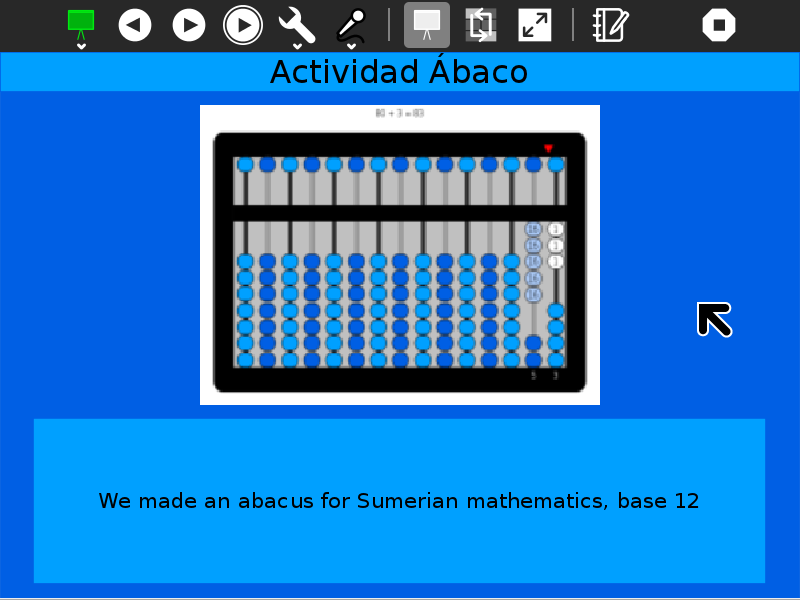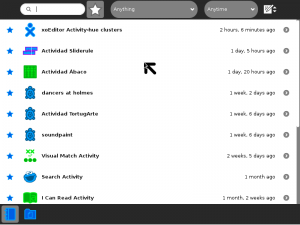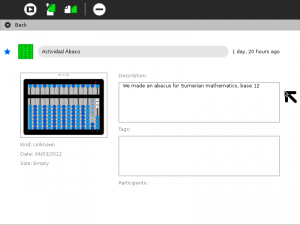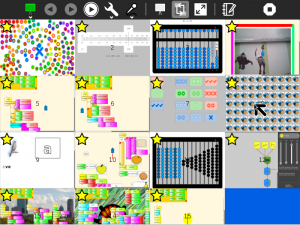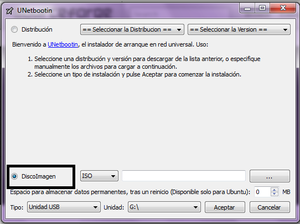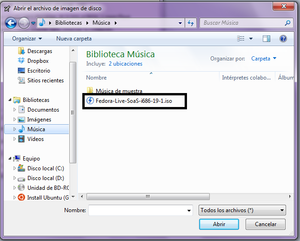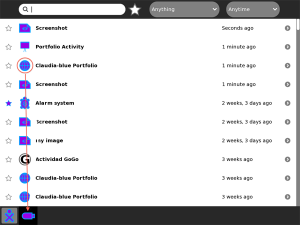Difference between revisions of "Activities/Portfolio"
| Line 12: | Line 12: | ||
[[File:Abacus-detail.png|300px]] | [[File:Abacus-detail.png|300px]] | ||
| + | |||
| + | [[File:Portfolio-thumbs.png|300px]] | ||
When running the activity, use the ◀ and ▶ buttons to step one-by-one through the slide show. Use the autoplay button to start/pause a slide show. The delay between slides can be controlled by the interval chosen in the combo box. (The default is 10 seconds.) | When running the activity, use the ◀ and ▶ buttons to step one-by-one through the slide show. Use the autoplay button to start/pause a slide show. The delay between slides can be controlled by the interval chosen in the combo box. (The default is 10 seconds.) | ||
Revision as of 16:57, 5 April 2012
Portfolio Activity
The portfolio activity creates a slide show from Journal entries that have been 'starred'...
How to use Portfolio
Before you launch the activity, use the ☆ on the left of each Journal entry to mark that entry for inclusion in the portfolio. The Portfolio Activity will use the entry title as well as the preview image and description.
When running the activity, use the ◀ and ▶ buttons to step one-by-one through the slide show. Use the autoplay button to start/pause a slide show. The delay between slides can be controlled by the interval chosen in the combo box. (The default is 10 seconds.)
Did you know that:
- you can record audio notes for each slide; the notes are played back whenever the slide is viewed;
- the colors used in the background are taken from the XO colors of the user;
- a warning is displayed if there are no starred entries in your Journal;
- the slide show can be saved as an HTML document that can be shared; and
- in the thumbnail view, you can reorder your slides (by dragging them).
The Toolbars
- from left to right
- the Activity toolbar button (shown in the open position)
- the previous-slide button returns to the previous slide shown (also activated by typing <Ctrl-p>)
- the next-slide button: goes to the next slide in the sequence (also activated by typing <Ctrl-n>)
- the auto-play button: starts a slide show with a user-settable pause between each slide
- the Customize toolbar button (shown below)
- the thumbnail-view toggle button: used to switch to thumbnail view, where you can reorder the sequence of the slides by dragging them
- the full-screen view button: hides the toolbars (Return from full-screen by hitting the Esc key.)
- the stop button: used to exit the activity
- the Activity name field is used to change the name of the activity (The name is used by the save-to-HTML button.)
- the share button is disabled since the activity does not support sharing
- the keep button is deprecated and only appears on some Sugar systems
- the save-to-HTML button: used to save a copy of your presentation to the Sugar Journal as an HTML file
- the save-to-PDF button: used to save a copy of your presentation to the Sugar Journal as an PDF document
- the combo box lets you select a delay time between slides when using auto play (Chose two-seconds, ten-seconds, thirty-seconds, or one-minute delay).
- the refresh button scans the Journal to pull in any changes made since the Portfolio activity was launched.
- the record button is used to record an audio note associated with the current slide
- the playback button is active when there is audio associated with the current slide
- the save button is active when there is a new recording to save
How to save your portfolio to HTML or PDF
Each time your launch the Portfolio activity, it will update to reflect the current contents of your Journal. If you want to save a portfolio that represents a particular moment in time (or you want to share your portfolio with someone else), you need to save it as an HTML or PDF document. Select the "Save as HTML" or "Save as PDF" option from the Activity toolbar menu and the content of the portfolio will be saved as a document in the Journal.
Tip: Open your Journal to make sure the portfolio has been saved.
Tip: You may want to copy the HTML or PDF file to a USB to open it in a different XO, or any other computer, using the Browse or Read activity.
Where to get Portfolio
The Portfolio activity is available for download from the Sugar activity portal: Portfolio
The source code is available on the Sugar Labs Gitorious server.
Sample portfolios
Where to report problems
You can report bugs and make feature requests on our bug-tracking system (You need to create an account first). To list all open tickets of Portfolio you can use query component=Portfolio. You are also welcome to leave comments/suggestions on the Talk:Activities/Portfolio page.
Mock-ups for future development
This are mock-ups previous to Walter's implementation. The activity icon and play icon needs to be updated in the toolbar, and also the timer selector.
Horizontal split works better for long descriptions, and vice versa. Maybe the activity use one template or another based on this.
Showing areas for thumbnail and description in the design grid:
